If you’re the founder of a startup that’s just starting to take off, or the head of a marketing team struggling to get budget approvals, chances are you’re always looking for ways to make the most of your financial resources.
This constant tug-of-war over budget becomes even more challenging when deciding which marketing tools for your startup to invest in.
As we delve more into 2025, marketers have started relying more and more on the secondary assistance that these tools provide — since simple strategy and guesswork will not do the magic anymore. According to recent data, the average cost-per-click on digital platforms has risen over 10% since 2023 alone, squeezing startup budgets tighter than ever before. For startups and small businesses with limited financial runway, every marketing dollar spent must deliver measurable impact.
Yet, a limited budget doesn’t mean you're doomed to mediocre results. The good news is, thanks to the competition and the rapid advancements in AI, automation, and analytics, there are a lot of affordable yet powerful marketing tools available in the market today. Small-medium businesses and growing startups can easily afford them.
But with so many options available, choosing the right tool can be overwhelming, especially if you don’t have past experience using them.
To make things easier for startup founders and marketing leaders, we’ve put together a comprehensive list of budget-friendly marketing tools covering SEO, content creation, competitor intelligence, social media, email marketing, analytics, and more — so you can skip the hours of research and jump straight into scaling your business efficiently.
Best cost-effective marketing tools for startup: by category
| Category | Tool Name | Pricing | Key Features | Why Choose This |
|---|---|---|---|---|
| SEO | Ubersuggest | Free (limited searches), paid plans from $12/month | Keyword research, backlink tracking, competitor insights | Affordable and user-friendly SEO solution for startups |
| Content Creation | Canva | Free; Pro plan starts at $6.50/month | Drag-and-drop design, AI-powered tools, social media scheduling | Non-designers can create professional visuals at low cost |
| Competitor Intelligence | COIN by Kaya | $100/month | Ad tracking across platforms, competitive insights, real-time messaging analysis | Budget-friendly competitor tracking without enterprise costs |
| Social Media Management | Buffer | Free for 3 channels; Paid plans from $5/month per channel | Scheduling & automated posting, analytics, team collaboration | Straightforward social media scheduling and analytics |
| Email Marketing | Mailchimp | Free up to 500 contacts; Paid plans start at $13/month | Drag-and-drop email builder, automation, audience segmentation | Cost-effective email marketing with automation features |
| Marketing Automation | HubSpot Marketing Hub | Starts at $15/month | Email automation, landing pages, CRM integration | Enterprise-grade automation at a startup-friendly price |
| Analytics | Google Analytics | Free for startup requirements | Traffic tracking, goal tracking, custom dashboards | Comprehensive analytics at no cost |
| CRM | Zoho CRM | Free for 3 users; Paid plans start at $20/month | Contact and deal management, workflow automation, AI insights | Strong CRM features at a fraction of enterprise pricing |
| CRO | Hotjar | Free up to 20k monthly sessions; Paid plans start at $49/month | Heatmaps, session recordings, funnel tracking | Data-driven CRO insights for startups |
| AI Copywriting | Copy.ai | Free plan; Paid plans start at $49/month | Templates for blogs, ads, emails, social media; AI-powered copy generation | Generate high-quality marketing content fast without hiring writers |
| Landing Page Builder | Unbounce | Starts at $99/month | Drag-and-drop builder, A/B testing, Smart Traffic, conversion analytics | Rapidly test and launch high-converting pages without needing developers |
| Project Management | Trello | Free for core features; Paid plans from $5/user/month | Kanban boards, checklists, team collaboration, Power-Ups | Simple visual project tracking ideal for lean marketing teams |
Best SEO tool for startups: Ubersuggest
Ubersuggest, founded by Neil Patel, offers small businesses an intuitive SEO toolkit. It simplifies keyword research, competitive analysis, and site audits, making it easy for startups to quickly improve organic search visibility.
Key features:
- Keyword research and domain analysis
- Backlink tracking and SEO audits
- Competitor insights including traffic estimation and top-performing content
Why choose this:
Ubersuggest’s affordability and simplicity make it a go-to solution for startups wanting to improve their SEO performance without large upfront investments.
Pricing: Free (limited searches), paid plans from $12/month
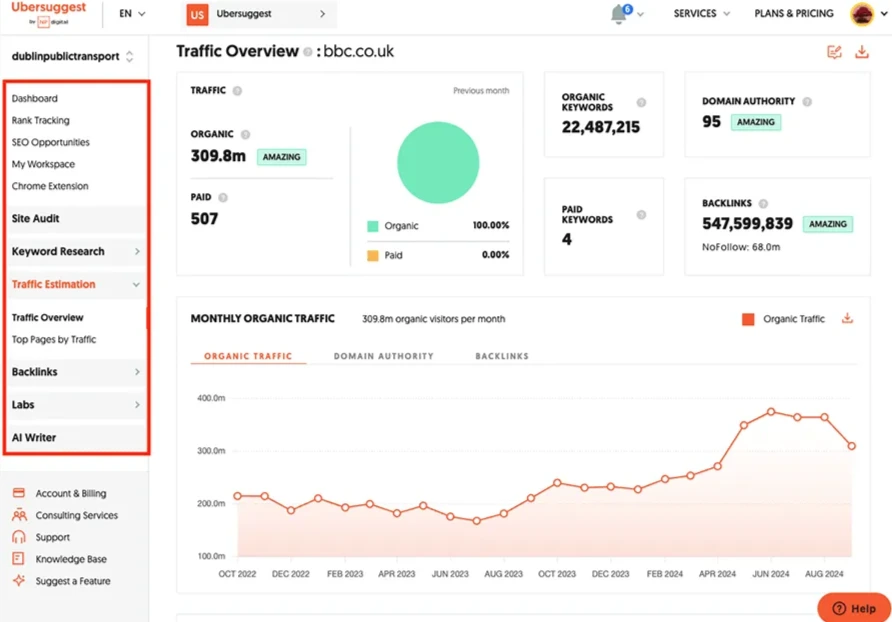
Ubersuggest
Best content creation tool for startups: Canva
Canva has shifted the entire content creation ecosystem, enabling non-designers to produce professional-looking graphics effortlessly. For startups aiming for engaging visuals without dedicated designers, Canva provides a flexible, user-friendly platform.
Key features:
- Drag-and-drop design editor with customizable templates
- AI-powered tools like Magic Design and text-to-image creation
- Built-in social media post scheduling and content calendar
Why choose this:
Startups can effortlessly elevate their visual content strategy at a fraction of traditional design costs using Canva’s extensive toolkit.
Pricing: Free; Pro plan starts at $6.50/month
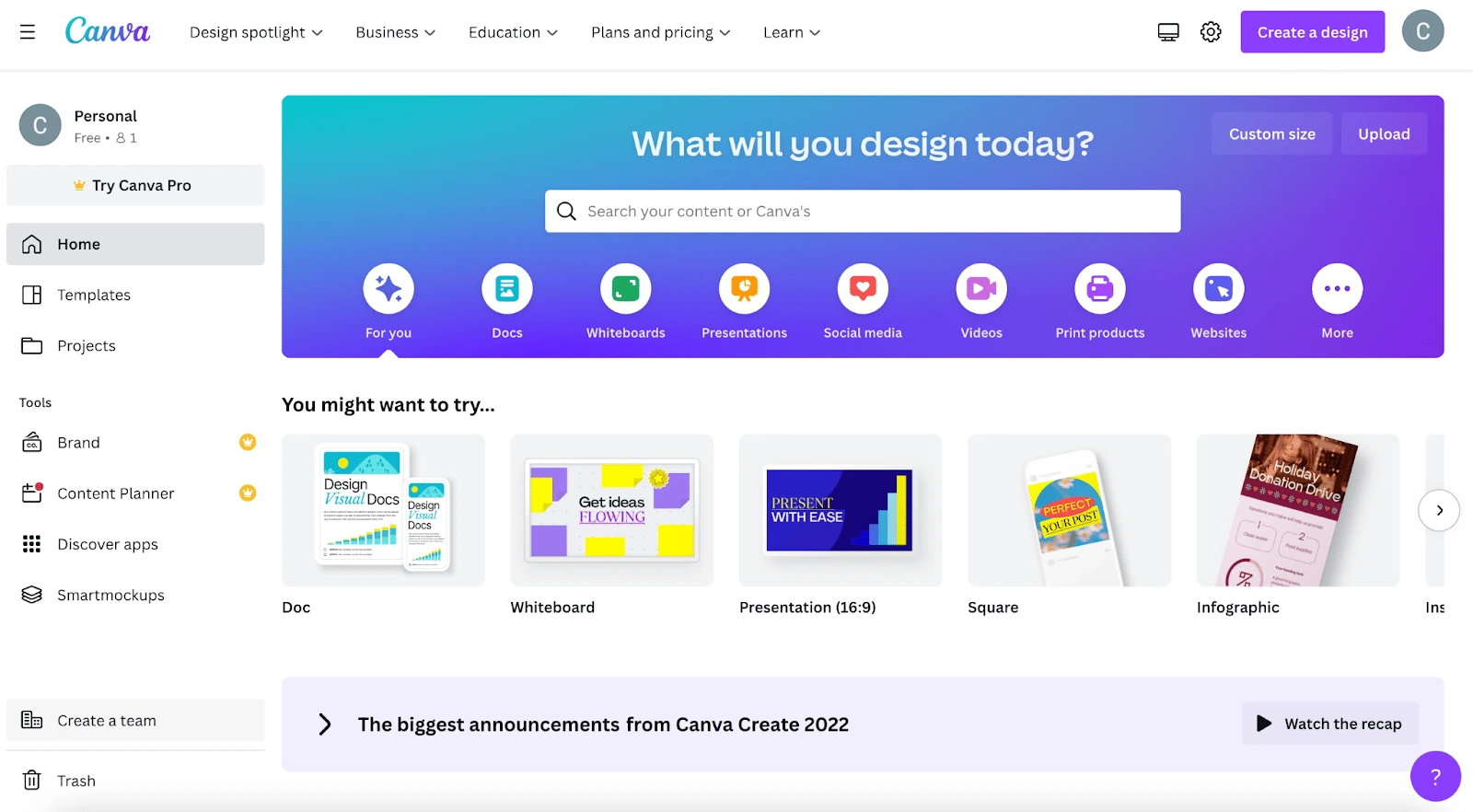
Canva
Best AI copywriting tool: Copy.ai
Copy.ai helps startups automate content creation across blogs, social media, emails, and ads. Instead of spending hours brainstorming or drafting copy, founders and lean teams can use Copy.ai to generate high-quality content ideas and drafts in seconds.
Key features:
- Pre-built templates for emails, ads, product descriptions, and more
- AI-powered brainstorming tools for taglines, blog intros, and captions
- Team collaboration features for editing and reviewing content
Why choose this:
For startups with limited content resources, Copy.ai serves as a fast and affordable way to maintain consistent output across channels — without needing a dedicated writer. It’s especially useful for marketers juggling multiple campaigns on a tight schedule.
Pricing: Free plan available; Paid plans start at $49/month
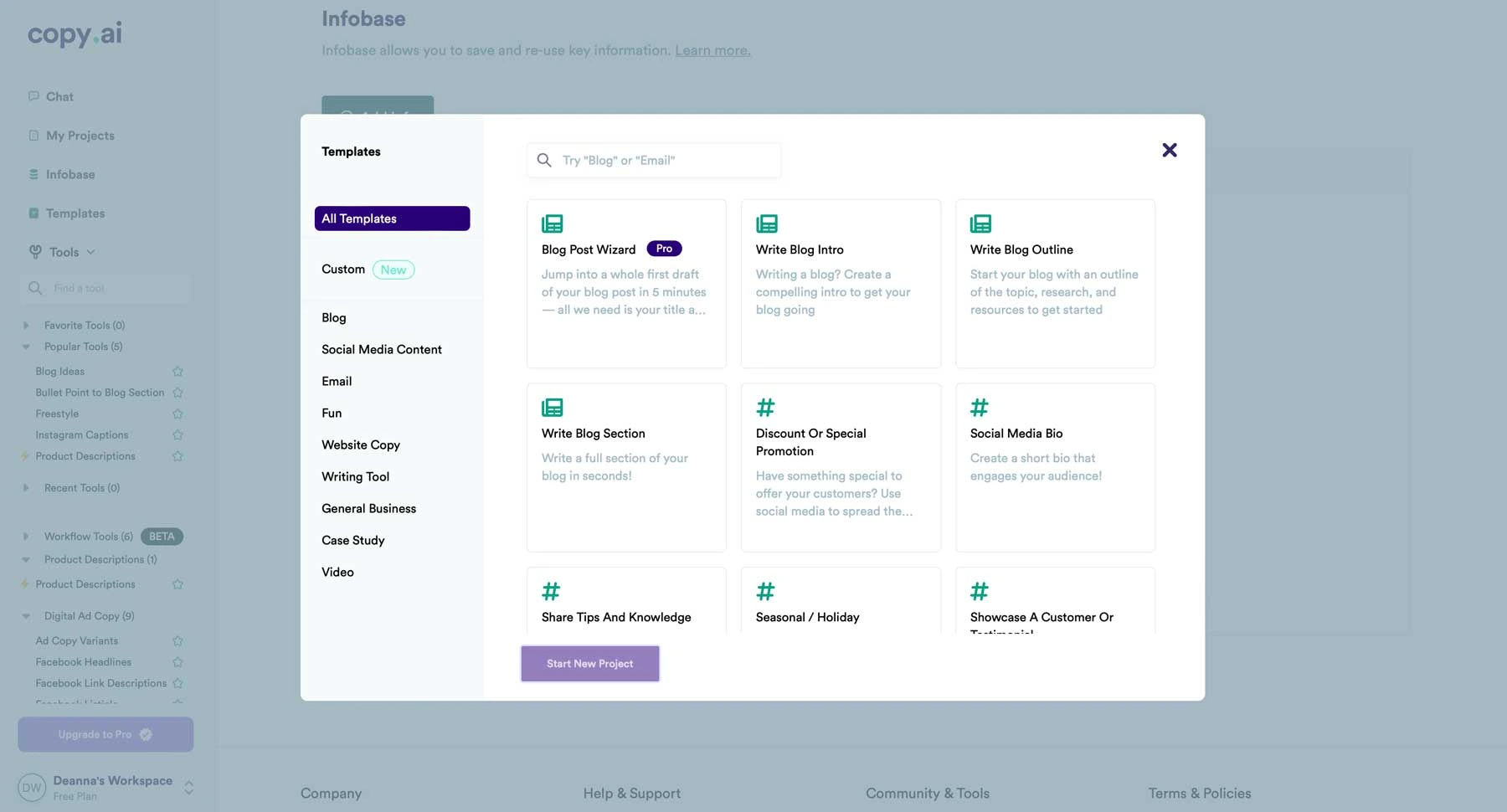
Copy.ai
Best competitor intelligence tool: COIN by Kaya
Traditional competitor tracking involves manually browsing ad libraries, estimating messaging trends, and making assumptions about what works. While this approach has worked till now, for startups and SMBs operating with a tight budget and resources, it isn’t the best approach. Competitor Ad Intelligence Tool (COIN) gives startups an affordable yet powerful alternative, offering instant insights into what’s driving success for competitors across Google, Meta, LinkedIn, and other key platforms.
With rising ad costs and tight marketing budgets, SMBs can’t afford to experiment blindly. COIN pulls back the curtain on where competitors are investing their ad spend, which creative assets perform best, and how they’re refining their messaging. Instead of trial and error, startups can allocate their budget strategically — focusing on proven tactics that is already generating results.
Key features:
- See where competitors are running ads on Google, LinkedIn, Meta, TikTok, and Bing without expensive software.
- Identify top-performing formats, landing pages, and spending trends to replicate what works.
- Analyze successful ad copy and audience targeting to refine your own campaigns before spending.
Why choose this:
COIN is designed for startups and small businesses that need competitor intelligence without enterprise-level pricing. Instead of costly data platforms, COIN offers a lean, actionable, and affordable way to compete smarter, optimize faster, and scale without overspending.
Pricing: $100/month
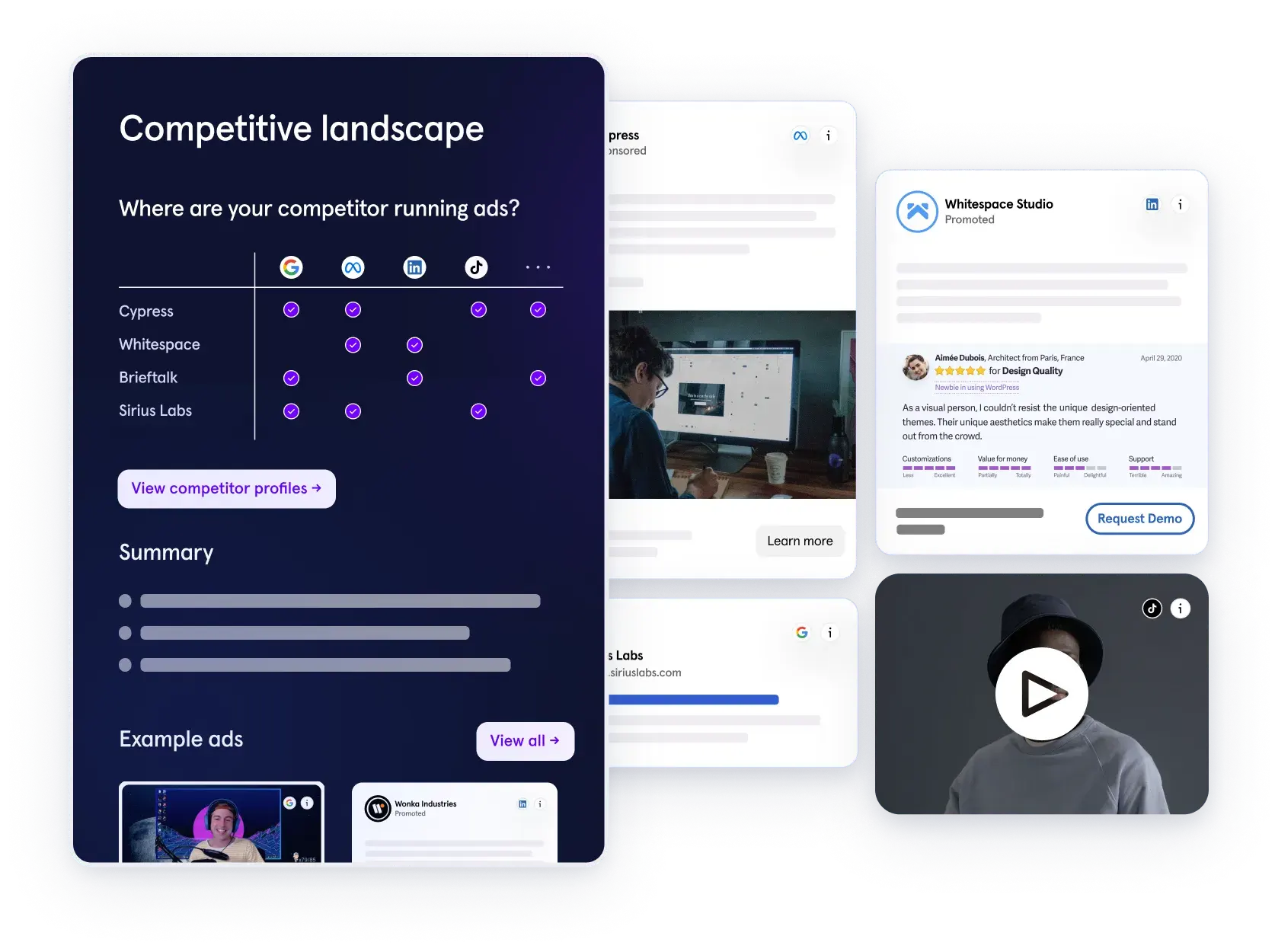
Competitor Ad Intelligence Tool (COIN) by Kaya
Best landing page builder: Unbounce
Unbounce enables startups to launch high-converting landing pages quickly — without developers or designers. Whether you’re running ads, collecting emails, or testing offers, Unbounce gives you the tools to iterate fast and optimize performance.
Key features:
- Drag-and-drop builder with conversion-focused templates
- A/B testing and dynamic content replacement
- AI-powered Smart Copy and Smart Traffic features
Why choose this:
Startups can rapidly test value propositions, CTAs, and page layouts to improve conversions without relying on code. Unbounce’s optimization features make it ideal for performance-driven teams looking to scale paid campaigns.
Pricing: Starts at $99/month
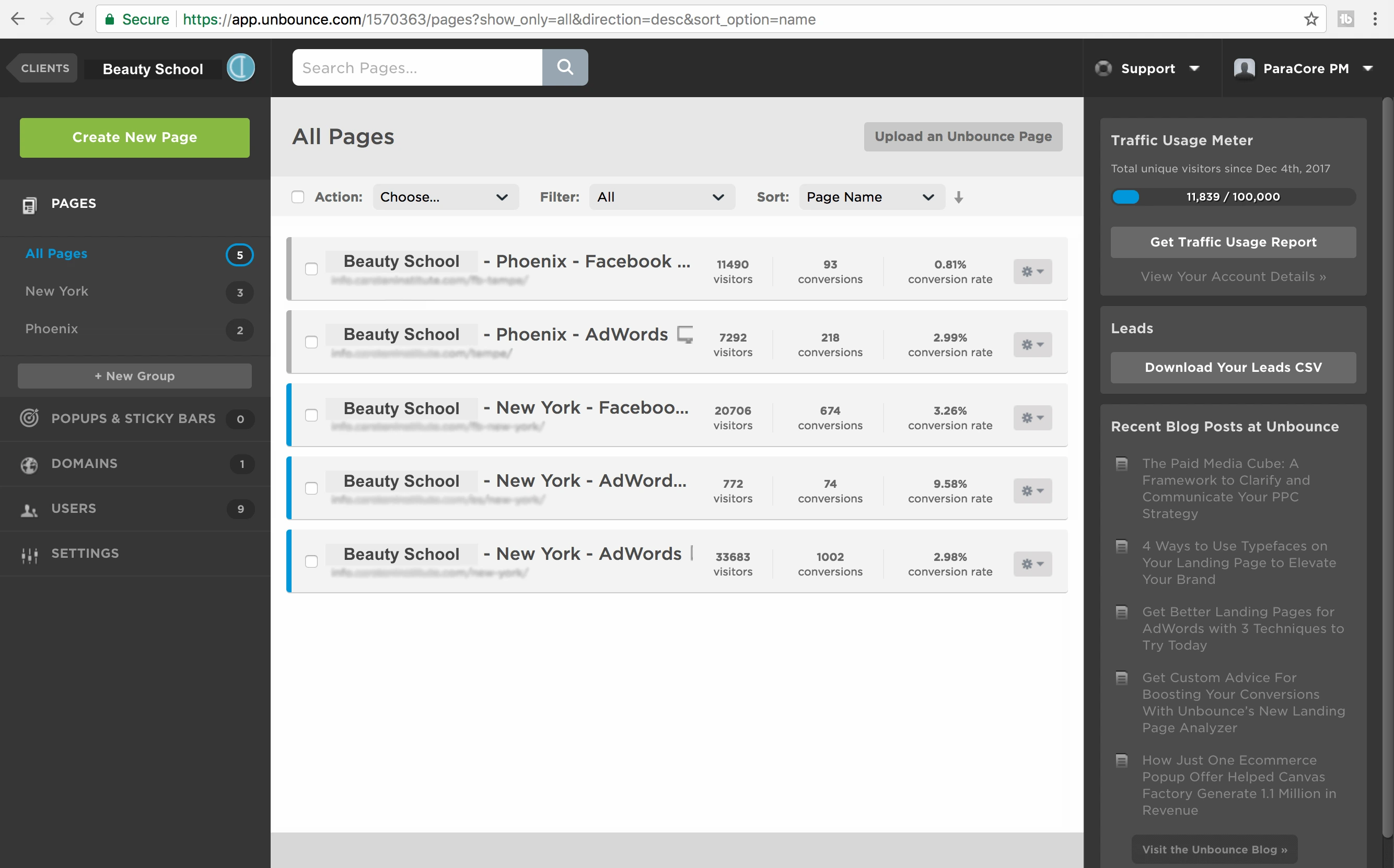
Unbounce
Best social media management tool for startups: Buffer
Buffer simplifies social media management, allowing companies to schedule content efficiently and track performance without overwhelming complexity. Its ease of use makes it a popular choice among small teams.
Key features:
- Scheduling and automated posting across channels
- Robust analytics to measure engagement and refine strategy
- Collaborative features for managing team workflows
Why choose this:
Buffer gives startups a straightforward way to build an engaged social media presence with minimal hassle and cost.
Pricing: Free for 3 channels; Paid plans from $5/month per channel
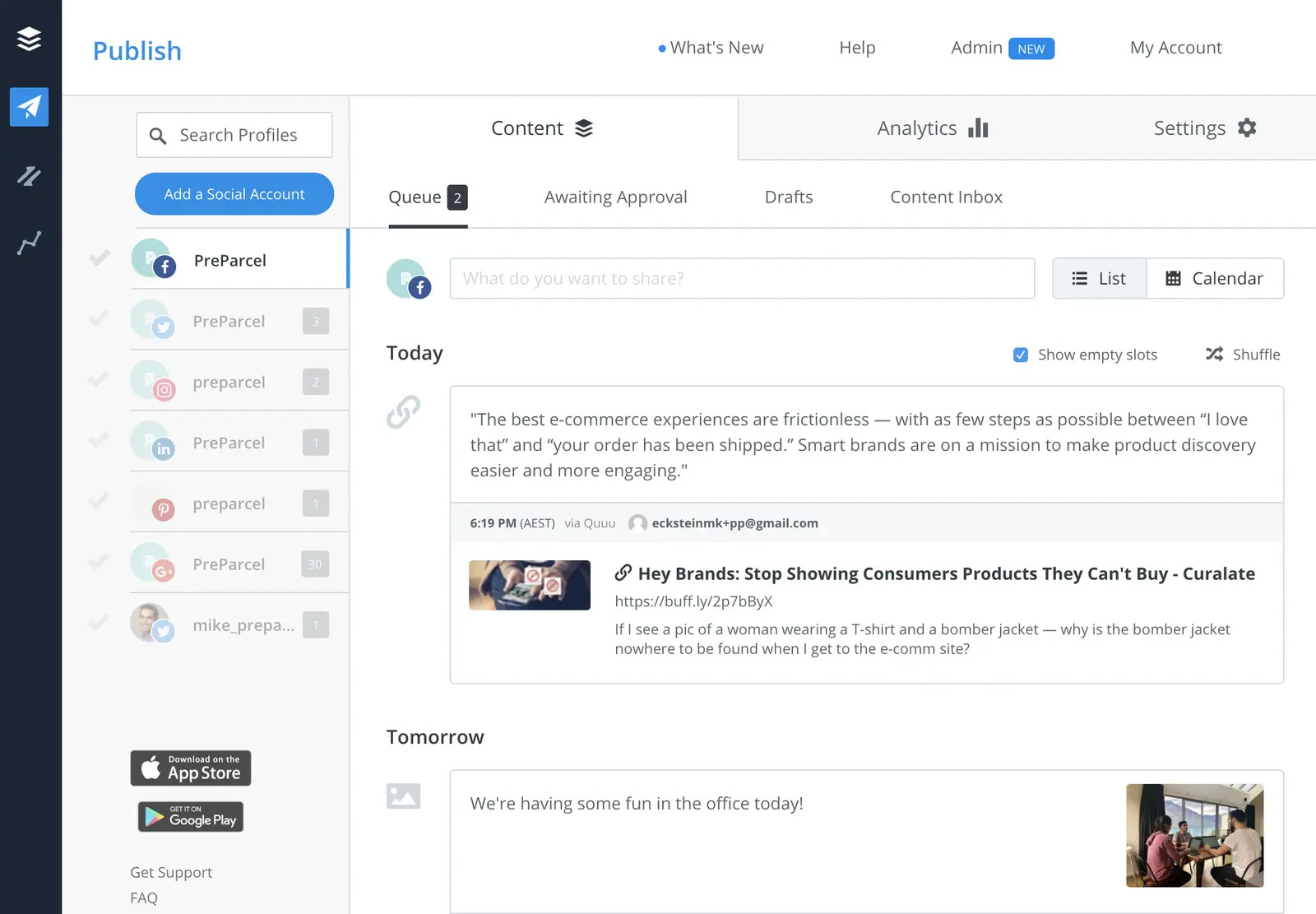
Buffer
Best email marketing tool: Mailchimp
Mailchimp is a trusted solution for small businesses seeking affordable yet powerful email marketing. It enables startups to build sophisticated email sequences and segment audiences without overspending.
Key features:
- Intuitive drag-and-drop email builder
- Marketing automation and targeted audience segmentation
- Reliable analytics and straightforward performance reporting
Why choose this:
Mailchimp offers the essentials to grow and nurture your audience, making it an ideal first choice for email marketing.
Pricing: Free up to 500 contacts; Paid plans start at $13/month
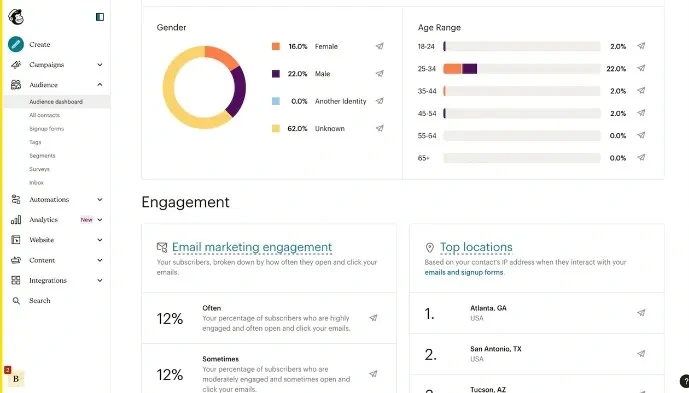
Mailchimp
Best project management tool: Trello
Trello helps marketing teams plan, track, and execute campaigns visually using boards, lists, and cards. It’s simple enough for solo founders but powerful enough for cross-functional collaboration.
Key features:
- Visual Kanban-style boards with drag-and-drop tasks
- Due dates, checklists, labels, and team comments
- Power-Ups for Slack, Google Drive, calendars, and more
Why choose this:
Trello helps startups stay organized across sprints, content calendars, and product launches. It removes the friction from day-to-day coordination so your marketing efforts stay on track and on time.
Pricing: Free for core features; Paid plans start at $5/user/month
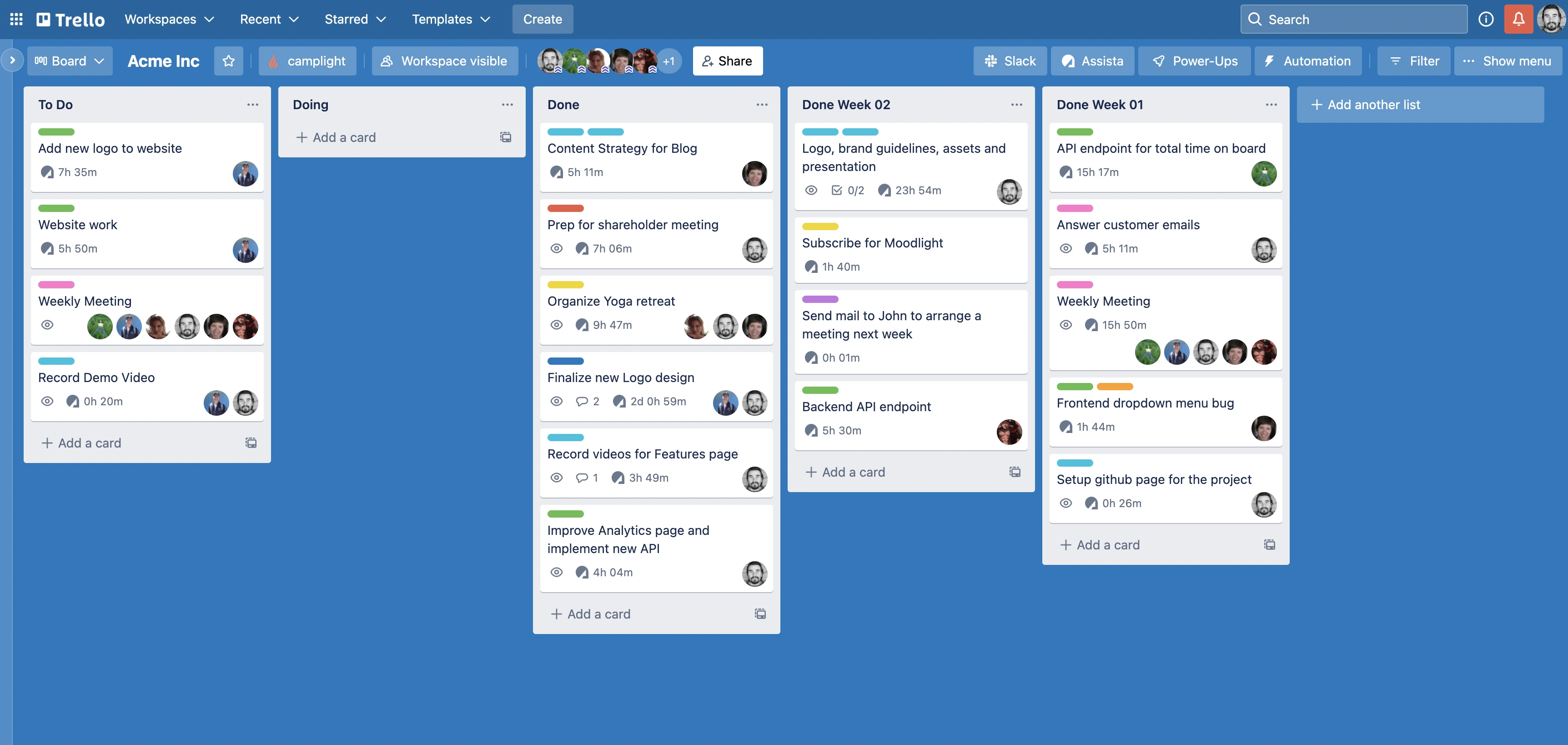
Trello
Best marketing automation tool: HubSpot Marketing Hub (Starter Plan)
HubSpot’s Starter plan brings enterprise-grade marketing automation to SMBs at a competitive price. For startups focused on nurturing leads and automating repetitive tasks, HubSpot provides significant efficiency gains.
Key features:
- Email automation, lead nurturing, and personalization
- Landing page creation optimized for conversions
- Seamless integration with HubSpot CRM for smooth customer journeys
Why choose this:
HubSpot allows startups to scale marketing efforts and automate workflows without hefty price tags.
Pricing: Starts at $15/month
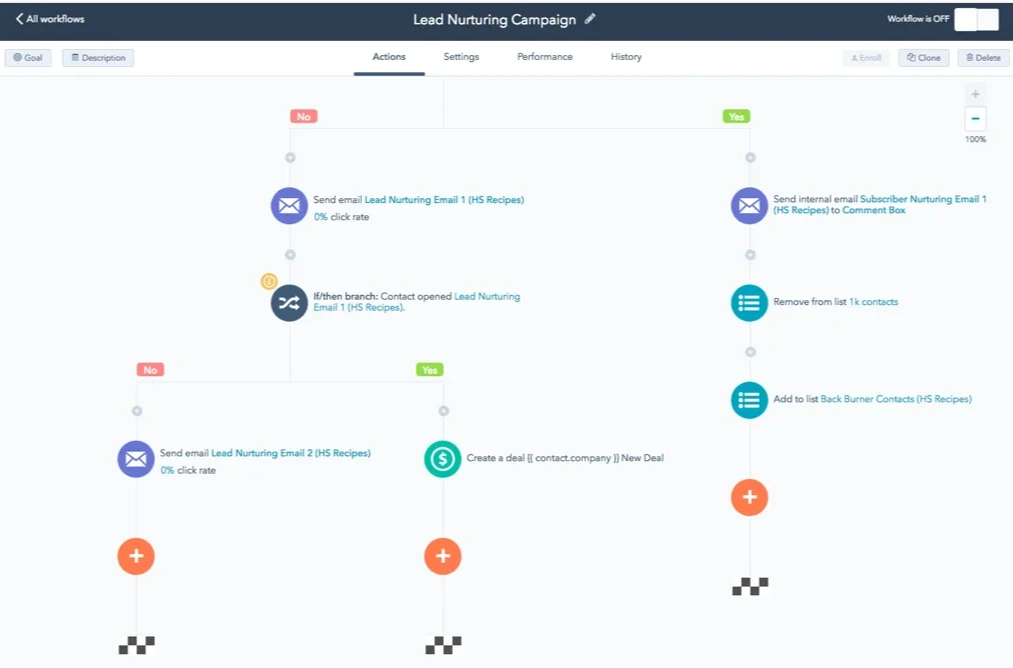
Hubspot
Best analytics tool for startups: Google Analytics
Google Analytics remains unmatched for startups needing powerful web analytics without any cost barrier. It provides essential visitor and behavior insights to optimize your digital presence.
Key features:
- Comprehensive website traffic tracking and user insights
- Advanced goal tracking and detailed conversion analysis
- Custom dashboards for real-time visibility
Why choose this:
Google Analytics enables informed decision-making, helping startups continuously improve their marketing performance without spending a dime.
Pricing: Free for startup requirements
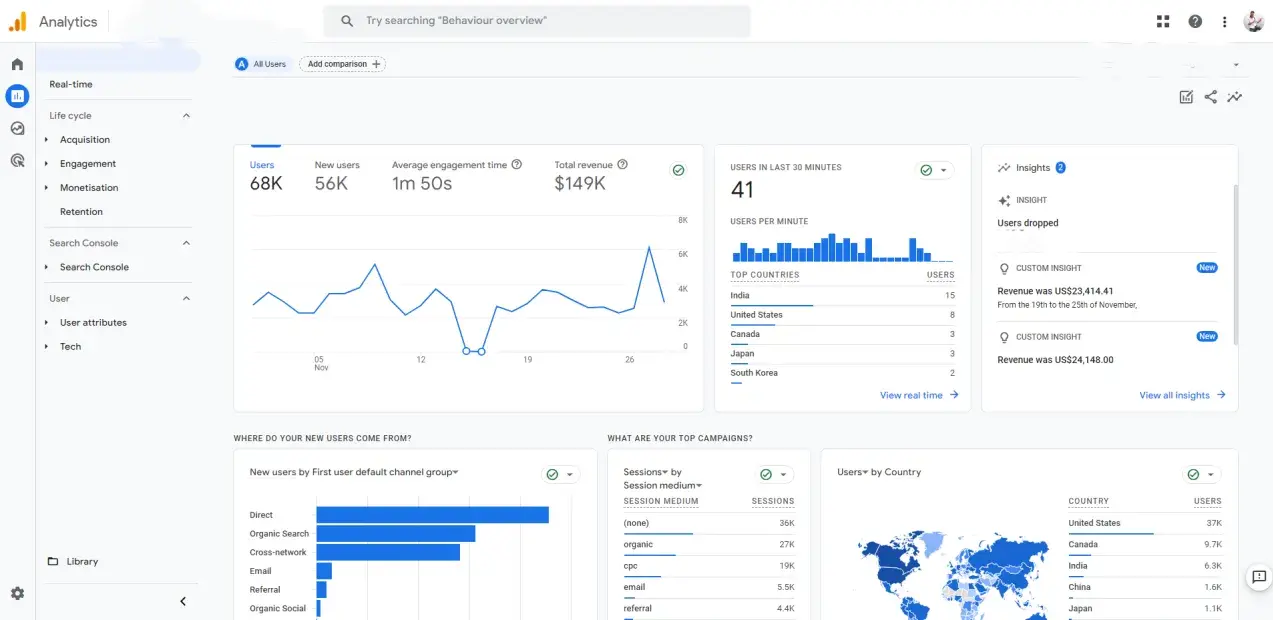
Google Analytics
Best CRM tool: Zoho CRM
Zoho CRM delivers strong customer relationship management at a fraction of enterprise solutions' cost. For startups seeking affordable ways to manage leads, track deals, and automate customer interactions, Zoho CRM is a perfect fit.
Key features:
- Efficient contact and deal management
- Workflow automation to streamline daily tasks
- AI-powered insights to help close more deals faster
Why choose this:
Zoho CRM offers significant sales efficiency gains without significant investment, making it ideal for lean startups.
Pricing: Free for 3 users; Paid plans start at $20/month
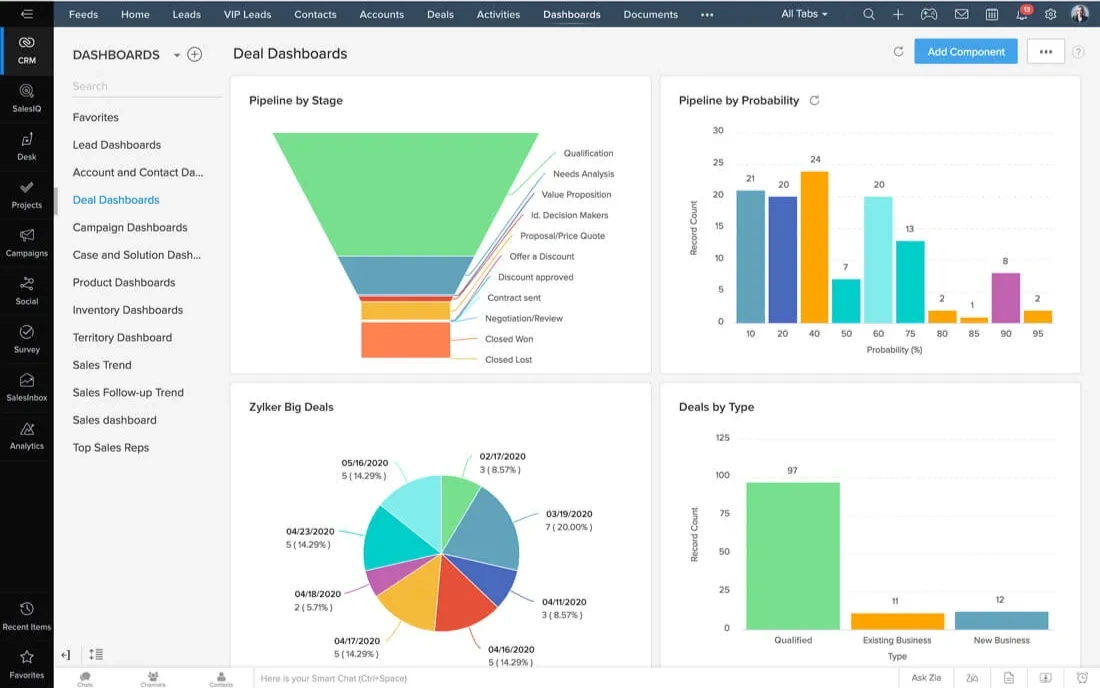
Zoho CRM
Best conversion rate optimization (CRO) tool: Hotjar
Hotjar helps startups understand how users behave on their websites, providing visual insights that drive conversions. Its affordability and ease of use help startups make impactful improvements quickly.
Key features:
- Heatmaps and session recordings for visual user insights
- On-page surveys and feedback collection tools
- Funnel tracking and optimization to identify drop-offs and improve conversions
Why choose this:
Hotjar confirms hypotheses based on data, helping startups maximize conversion rates without major investments.
Pricing: Free up to 20k monthly sessions; Paid plans start at $49/month
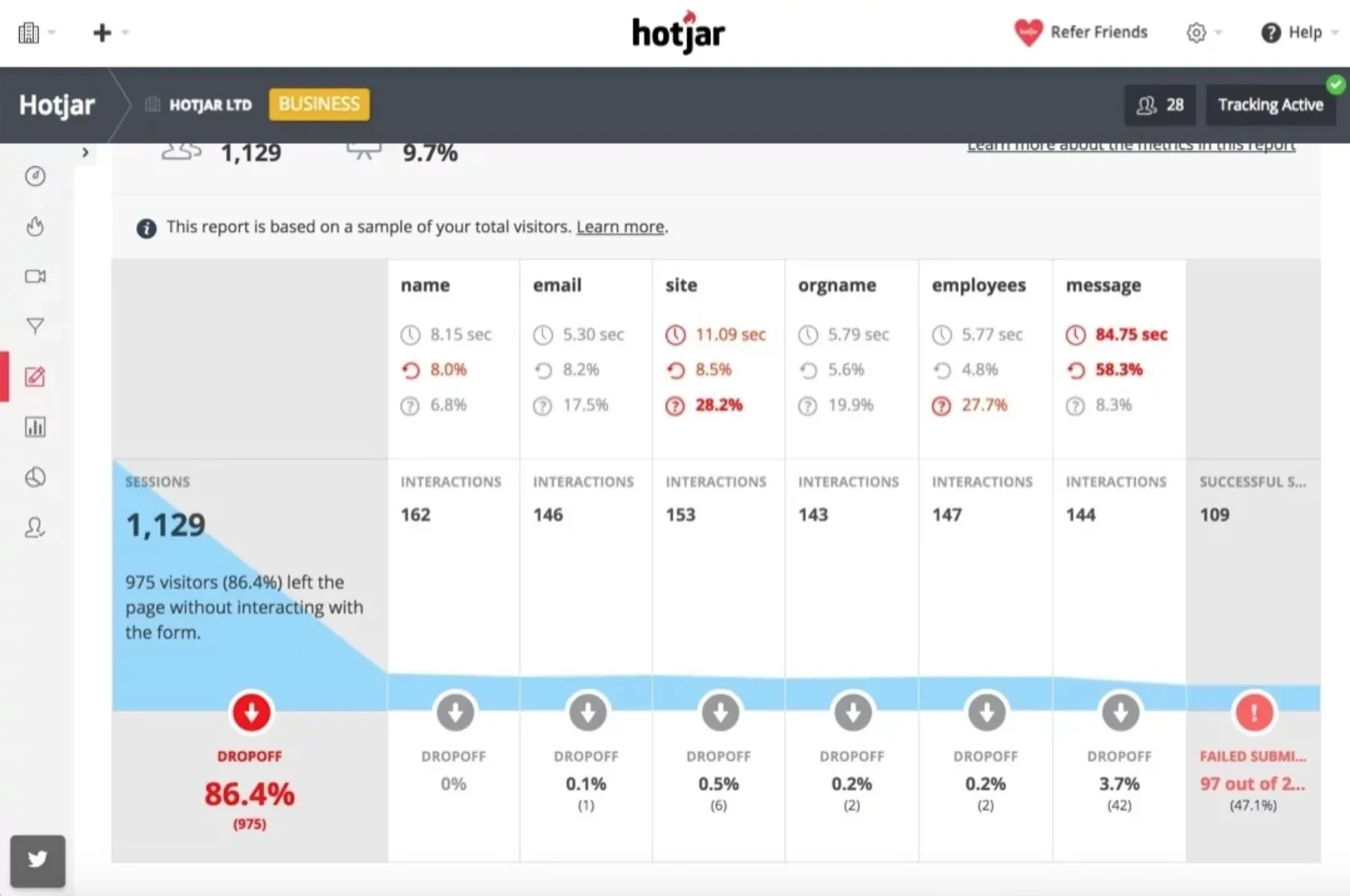
Hotjar
How to get started with building a budget-friendly marketing tool-stack for startup
Startups don’t have the luxury of big marketing budgets. Every tool needs to earn its place in your stack by delivering tangible value. But how do you make that happen? The key is avoiding shiny-object syndrome while ensuring each tool contributes directly to lead generation, conversion, or customer retention.
It can be quite overwhelming when you think about building a budget-friendly tool-stack for your startup. Here are a few steps that you can follow:
-
Start with your biggest marketing bottleneck, not trends
Instead of picking tools based on what’s popular, identify where your marketing process is breaking down. Are you struggling to drive traffic? Are you lacking automation for scaling? Or, are you losing leads due to slow follow-ups? Invest in tools that fix immediate pain points before expanding your stack.
-
Focus on tools that improve efficiency over feature overload
Free tools can be tempting, but they often lack scalability and depth. On the other hand, many paid tools bundle in unnecessary features. Ask yourself: will this tool save time, improve accuracy, or increase revenue? If it’s not solving a problem efficiently, it’s just adding clutter.
-
Use free trials with a clear evaluation framework
Free trials are great, but only if you use them with clear testing criteria. Set specific success metrics, such as whether an SEO tool finds keywords that drive at least 10% more traffic. Refer to side-by-side comparisons to see if a tool’s premium features justify the cost.
-
Factor in setup and learning time as a hidden cost
The most affordable tool isn’t always the best choice if it requires weeks of setup, learning, or workarounds. A tool that blends effortlessly with your existing workflow and has a relatively easier learning curve will always have a higher return on investment than a cheaper tool that slows you down.
-
Choose tools that can scale as your startup grows
Many startups pick tools that work for their current needs but outgrow them quickly. A good tool should scale with your business rather than force you into costly migrations or re-training down the line. Look for tools that offer modular upgrades rather than rigid pricing tiers. This will help you avoid the hassle that comes along with switching tools.
-
Rely on real-world case studies, not just product pages
A tool’s landing page will always highlight the best-case scenario, but real-world case studies tell a different story. Look for success stories from businesses with similar challenges to see how the tool actually performs beyond marketing claims. You can always ask your network for what type of tools they use.
By focusing on real needs, efficiency, and smart testing, startups, and small-medium-sized businesses can build a lean, high-impact marketing stack — one that drives actual quantitative results without unnecessary complexity.
FAQ
What is a digital marketing tool?
What is startup marketing?
What is a startup marketing agency?
Final thoughts
If you search for “best budget-friendly digital marketing tools for startups” online, you’ll find countless listicles. But instead of giving you clear answers, most of them overwhelm you with endless options, leaving you to spend hours researching which tool actually fits your needs.
That’s exactly what we wanted to solve with this guide. Instead of handing you another long list to sift through, we’ve curated the most effective, budget-friendly tools across all key marketing functions — helping your business find solutions that deliver real results without unnecessary costs.
However, with increasing competition across industries, marketing success requires a blend of both tools and strategy. The right tool, paired with the right execution, can help a small business grow into a recognized brand.
However, many companies make the mistake of relying too heavily on tools while neglecting the strategic execution behind them. A tool is only as powerful as the person using it. Without prior experience or a clear strategy, even the best tools can become an unnecessary expense rather than an asset.
If your team lacks experience in marketing strategy and execution, it may be worth considering outsourcing to a marketing agency. Just as there are tools for different marketing functions, there are agencies specializing in different areas. This ensures that your marketing budget is spent wisely and effectively.
Here comes the best part: many agencies come equipped with their own advanced tech stack, eliminating the need for you to invest separately in expensive tools.
Here’s a quick success story of a company that made a similar move: Spotless Materials, a YC-backed nanotech company came to us because they were struggling with high cost-per-click (CPC) and declining ad performance. Although they had their own tool-stack, they lacked experience in using them. Our team utilized COIN’s competitor insights to optimize their bidding strategies, refine keyword selection, and outbid competitors where it mattered most. As a result, they could see a 72% drop in CAC (customer acquisition cost) and an 8x increase in conversions. Read more about Spotless’s story here.
Marketing an innovative product to consumers is no easy feat. Kaya has been great in strategizing new approaches and leveraging a multichannel strategy to increase overall revenue.
So, if you prefer to skip the learning curve and tool selection process, outsourcing your marketing to a specialized agency could be the smarter and more cost-effective route.



